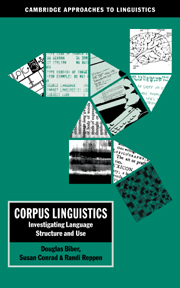Book contents
- Frontmatter
- Contents
- Preface
- 1 Introduction: goals and methods of the corpus-based approach
- Part I Investigating the use of language features
- 2 Lexicography
- 3 Grammar
- 4 Lexico-grammar
- 5 The study of discourse characteristics
- Part II Investigating the characteristics of varietie
- Part III Summing up and looking ahead
- Part IV Methodology boxes
- Appendix: commercially available corpora and analytical tools
- References
- Index
4 - Lexico-grammar
Published online by Cambridge University Press: 05 June 2012
- Frontmatter
- Contents
- Preface
- 1 Introduction: goals and methods of the corpus-based approach
- Part I Investigating the use of language features
- 2 Lexicography
- 3 Grammar
- 4 Lexico-grammar
- 5 The study of discourse characteristics
- Part II Investigating the characteristics of varietie
- Part III Summing up and looking ahead
- Part IV Methodology boxes
- Appendix: commercially available corpora and analytical tools
- References
- Index
Summary
Investigating lexico-grammatical issues
In Chapters 2 and 3, particular lexical and grammatical features were explored from a corpus-based perspective. Specifically, in Chapter 2 we discussed how words have strong association patterns with other words – their “collocations.” Then, in Chapter 3 we discussed how grammatical structures can similarly have strong association patterns with other grammatical structures. In addition to those kinds of patterns, however, there may also be associations between words and grammatical structures – i.e., lexico-grammatical associations. In the present chapter, we focus on these relationships: between words and their grammatical environments, or between grammatical structures and their lexical environments.
The investigation of lexico-grammatical associations is particularly useful when we are attempting to distinguish between words or structures that are nearly synonymous in meaning. It turns out that lexico-grammatical associations can be considered from either end of the relationship. That is, we can distinguish between two nearly synonymous words by considering their associations with different grammatical constructions; and we can distinguish between two nearly synonymous grammatical constructions by considering their associations with different classes of words.
In the present chapter, we illustrate both kinds of research question:
How can nearly synonymous words, with the same grammatical potential, be distinguished in terms of use patterns relating to their grammatical associations?
We consider two different examples of this type. First, in Section 4.2, we examine the grammatical associations of two nearly synonymous adjectives: little and small. These two words are very similar in meaning, and both can occur in either attributive or predicative position, supporting the view that they are nearly synonymous.
- Type
- Chapter
- Information
- Corpus LinguisticsInvestigating Language Structure and Use, pp. 84 - 105Publisher: Cambridge University PressPrint publication year: 1998



